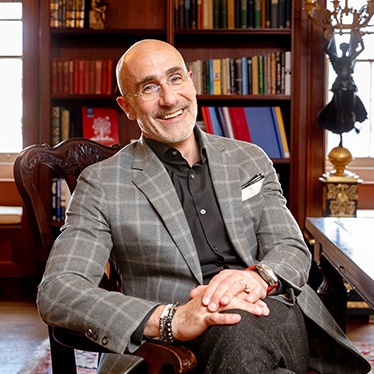Deeper Connections
August 8, 2018
In Washington, Maxwell and the think tank CSIS have entered a phase of enhanced collaboration, exemplifying by the new EMIR degree offered there.
The 12 students, who range in age from 27 to 54, are an impressive bunch themselves, including a political asylee from China who became a U.S. Army officer, a policy director for National Geographic, and a strategic cyber threat analyst at the Department of Justice.

It’s the first semester of a new version of Maxwell’s Executive Master’s in International Relations (EMIR), offered in collaboration with the Center for Strategic and International Studies (CSIS) in Washington, D.C. The 18-month program, for professionals in the D.C. area with at least seven years professional experience, is the first and only advanced IR degree offered by a major research university in collaboration with a leading global think tank.
It’s the kind of partnership and cross-fertilization hoped for back in 2014, when Maxwell entered into a strategic partnership with CSIS, moving the School’s Washington facilities into the newly built CSIS headquarters. Former Dean James Steinberg, who had served in the Clinton administration alongside CSIS president and CEO John J. Hamre, recognized mutual opportunities for faculty and students to interact with scholars and practitioners at the think tank.
Each year, some 200 Maxwell students participate in coursework at CSIS. They include undergraduates in the Washington Semester Program; graduate students in international relations or public administration, spending a summer, semester, or intercession taking courses or completing faculty-supervised internships; and graduate students interested in public diplomacy, who complete an intense, one-week journalism practicum at CSIS.
Students in Washington are taught by a combination of CSIS scholars and Maxwell faculty, the latter including University Professor and Phanstiel Chair Sean O’Keefe ’78 MPA. O’Keefe, a former NASA Administrator, Secretary of the Navy, and deputy director of the Office of Management and Budget, serves also as a distinguished senior advisor at CSIS. He is a frequent participant in CSIS programming.

“CSIS’s reputation and Washington location provide Maxwell students and faculty regular access to a range of leaders and practitioners — to an extent not feasible in Syracuse,” says O’Keefe, who is charged with developing opportunities to further nurture Maxwell/CSIS collaboration.
A new advisory board, now being formed with representatives from Maxwell and CSIS, will encourage collaboration as well. And Maxwell’s Merget Fund — honoring former associate dean Astrid Merget ’68 MPA/’73 PhD (SSc) — now supports Maxwell faculty members who will spend a semester teaching and conducting research in Washington. Additional Washington-based executive education programs are under discussion, bolstered by the success of the EMIR in D.C.
The Maxwell/CSIS marriage was a key selling point for the inaugural cohort of students who began the EMIR in January.
“While many professional and academic institutions skew towards learning that is either predominantly practical or predominantly theoretical, the EMIR program is giving us a chance to explore theory in practice rather than theory and, separately, practice,”
says Will Staton, a career educator with a decade of experience working in K-12 public education.
“CSIS's reputation and Washington location provide regular access to a range of leaders and practitioners.”
University Professor Sean O'Keefe
The EMIR in D.C. program “enables students to actually learn directly from senior leaders, policy makers, and think tank analysts,” adds Xiaoxu Lin, a microbiologist at Walter Reed Army Hospital. “It also provides opportunity for us to participate in CSIS events and learn more about the think tank operation.”
Dean David Van Slyke considers the partnership a unique School advantage and looks to further bolster collaboration. CSIS is just as enthusiastic. “The complexity of today’s global environment demands an interdisciplinary and practical understanding of the threats and challenges facing the international community,” says Hamre. “We want to create a space where innovative ideas can surface, and where the next generation of leaders can start to contribute meaningful policy ideas.”
By Renée Gearhart Levy
This article appeared in the spring 2018 print edition of Maxwell Perspective © Maxwell School of Syracuse University. To request a copy, email maxwellperspective@syr.edu.
Related News
School News

Nov 6, 2024
School News

Oct 29, 2024
School News

Oct 23, 2024
School News

Oct 17, 2024